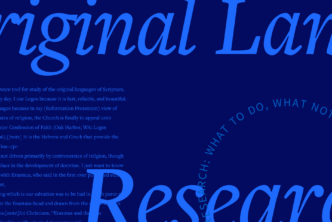Earlier this week, Mark Ward examined some criticisms of the King James Version via the preface to the Revised Standard Version. He mentioned dead words and “false friends” as examples of how the English language has changed over 600 years. In this excerpt from his book, Authorized, Ward examines the case of a specific false friend: a word whose meaning has changed too subtly to notice.
I have come to realize through years of obsessive-compulsive love of English that the distance between my English and that of the KJV is mostly due to something over which I and the KJV translators have no control: language change. The reason I can write an entire book evaluating the English readability of the KJV and yet not say one negative word about the choices of the KJV translators is that I don’t blame them for failing to be prophets. Language changes in far more interesting and complicated ways than I understood as an eighteen-year-old KJV reader. No one can fully predict the future of the English language, even those who—like the KJV translators—help shape that future.
But the biggest problem with KJV vocabulary is not actually the dead, obsolete words. When you run across emerod, you know you don’t know what it means, so you know when to pull out your dictionary. The biggest problem in understanding the KJV comes from “false friends,” words that are still in common use but have changed meaning in ways that modern readers are highly unlikely to recognize. Many words and phrases in the KJV are still in use but meant different things in seventeenth-century England—and yet what they now mean makes sufficient sense in context that most readers don’t notice the change. They don’t realize they need to look these words up. Unicorn may be one example. Amidst a list of other animals, we might simply assume that the KJV translators meant by the word what we mean by it.
One day during my work as a Bible textbook author, I was writing about the funny, interesting, and powerful story of Elijah. I was writing in particular for eighth graders, and all of the sudden, after twenty-five years of being a Bible reader, I realized what the King James translators meant when Elijah says, “How long halt ye between two opinions?” (1 Kgs 18:21).
I always assumed that halt here meant “stopping” between two opinions, and almost every other mature Christian I’ve spoken to (I’ve polled dozens) has said the same. People in the olden days used to say, “Halt!” when they wanted others to stop, right? “Halt!” medieval guards always said, “Who goes there?” Riding your horse past a HALT sign was a ticketed offense in ye olden days.
I had read the Elijah story in other versions before—likely the NASB, the NIV, and the TNIV. The NASB has the people “hesitating” between two opinions. The NIV has them “wavering.” But the ESV provided the key that uncovered my lifelong misunderstanding.
To halt wasn’t just to “stop” in 1611; halt was the verb form of a word used in the KJV Gospels in the parable of the great banquet: “Go out quickly into the streets and lanes of the city, and bring in hither the poor, and the maimed, and the halt, and the blind” (Luke 14:21). Halt in 1611 meant “lame.” Instead of “how long halt ye,” we would say something like “hobble” or “limp.” And that’s exactly what the ESV has: “How long will you go limping between two different opinions?”
More important, this is what the Hebrew text has too. The Hebrew word underlying “limping” is the one used to describe what happened to Mephibosheth when his nurse dropped him as a young child, leaving him lame (2 Sam 4:4). Interestingly, the word also occurs again within 1 Kings 18, and the ESV uses the same English word it used in verse 21, creating a sarcastically mocking picture: The prophets of Baal “limped around the altar that they had made” (v. 26). Elijah’s challenge to the people in 1 Kings 18:21 is a picturesque metaphor. An obscure one, to be sure, because the next phrase is not as clear as “between two opinions.” It’s literally something like “on two lopped-off boughs”—apparently crutches (this is the only time this word appears in the Old Testament). The whole phrase “describes a mind as wobbly and uncertain as the legs of someone lame.”
But I missed all that for years because my Elizabethan English was not as good as I always assumed it was.
* * *
Do you think you can recognize more of these false friends? Test yourself with this KJV Quiz.





